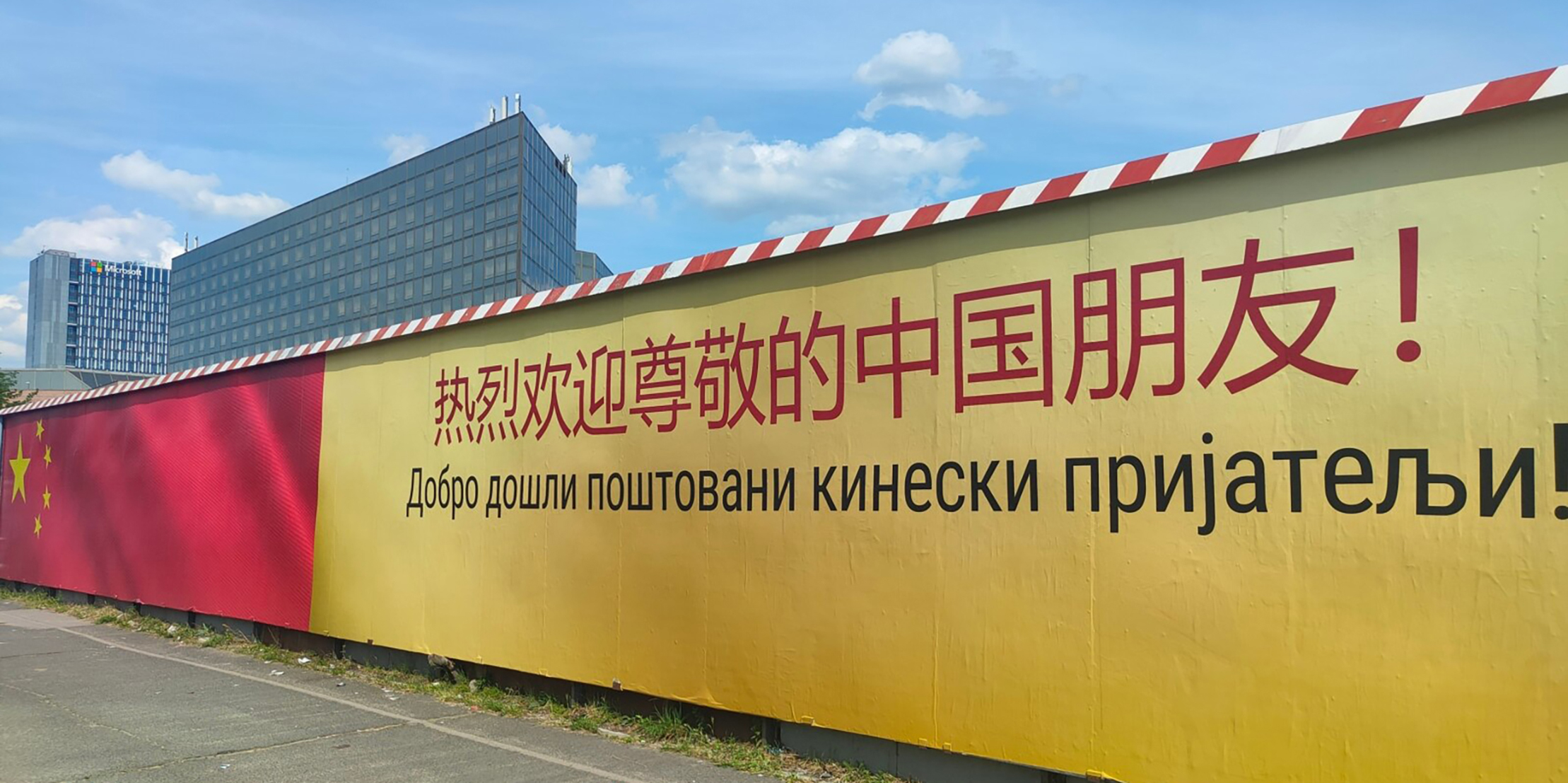Introduction
Since the founding of the global “Belt and Road” initiative in 2013, the People’s Republic of China has gradually expanded the scope of its presence in the Western Balkans. The most well-known examples of Chinese activity in the region are large-scale infrastructure projects, but Chinese presence has never been limited to this sphere. Recent months have demonstrated that Beijing’s influence in the Western Balkans is tending to expand even further, primarily thanks to the development of a strategic partnership with Serbia and its extension into the military sphere.
Infrastructure
The flow of Chinese investments into the region’s infrastructure began almost immediately after the announcement of the “Belt and Road” initiative. Since 2014, investors from China (mainly through the state-owned Exim Bank) are financing projects aimed at developing the region’s logistics, and Chinese contractors are carrying out their implementation.
Beijing’s interest in the region’s infrastructure projects lies in the very reason for the “Belt and Road” initiative’s existence – the restoration of old and construction of new trade routes between China and Europe (the European Union). The countries of the Western Balkans are an important link in this route.
The most significant logistics projects in the region involving China have been the Budapest–Belgrade high-speed railway, the Bar–Boljare highway (Montenegro), the Kičevo–Ohrid highway (North Macedonia), and the Banja Luka–Prijedor highway (Bosnia and Herzegovina, Republika Srpska).
Budapest–Belgrade
The flagship project of China’s “Belt and Road” initiative in the region (according to Chinese officials themselves) is the high-speed rail line between the capitals of Serbia and Hungary. The project is financed by a loan from Exim Bank amounting to $1.78 billion to the Hungarian government, covering 85% of the railway’s cost. Hungary will cover 15% of the cost from its own budget. It should be noted that the Hungarian-Chinese agreements are not public.
The Serbian section of the railway is being built by a consortium of Chinese consortium CRIC&CCCC (China Railway International Co. Ltd and China Communications Construction Company Ltd), while the Hungarian section is being built by the joint Hungarian-Chinese company CHRN (Chinese–Hungarian Railway Non-profit Limited Company).
The project has been under implementation since 2017, and the official opening is planned for late 2025 to early 2026.
The collapse of the canopy at the Novi Sad railway station, the reconstruction of which was taking place as part of the high-speed rail construction, resulting in the death of 16 people and mass anti-government protests, led to a political crisis in Serbia but did not halt the project.
Bar–Boljare
An important project for China was to become the Bar–Boljare highway, which is intended to connect Montenegro’s coast with the northern part of the country and Serbia by a high-speed motorway.
The Montenegrin government secured a $944 million loan from the Chinese Exim Bank to build the first section of the route (Smokovac–Mateševo), and the contractors were the Chinese companies China Road and Bridge Corporation (CRBC) and China Communications Construction Company (CCCC).
The construction process, which began in 2015, was marked by significant budget overruns, multiple delays, and unfavorable debt servicing conditions, which forced Montenegro to turn to the EU and Western banks (Société Générale, Deutsche Bank, Merrill Lynch International, Goldman Sachs International) for assistance. At that time, the government managed to reduce the interest rates on its debt and avoid a Chinese “debt trap”.
The first section of the highway was completed in 2022.
After completion of the Smokovac–Mateševo segment, there was a noticeable shift in approaches, primarily from the EU’s side. In July 2025, Montenegro and the European Bank for Reconstruction and Development (EBRD) signed a loan agreement for €200 million to build the second section (Mateševo–Andrijevica). At the same time, the Montenegrin government secured a grant of €150 million from the European Commission.
In addition to financing, the EBRD also oversees the contractor selection process, which includes companies from China as well as from Turkey, Azerbaijan, India, and the Netherlands. Final approval of the contractor is made by the EBRD Board of Directors.
Thus, Chinese companies can continue to participate in the project, but Beijing’s overall involvement will significantly decrease.
Kičevo–Ohrid
An example of Chinese involvement in North Macedonia is the construction of the Kičevo–Ohrid highway, financed by a loan from the Chinese Exim Bank. The contractor is the Chinese Sinohydro Corporation Limited, which was once in the “blacklist” of the World Bank Group and some other international financial institutions due to various violations.
The construction of the highway, with a total length of 57 kilometers, began in 2014, and the cost increased from the initially planned €374 million to €598 million. Several contract annexes were signed with Sinohydro to extend construction deadlines. But as of mid-July 2025, only the first 20 kilometers of the highway have been officially opened. According to government forecasts, completion of the work can be expected in late 2026 to early 2027.
Banja Luka–Prijedor
In Republika Srpska, China is implementing the Banja Luka–Prijedor highway project. In 2018, the authorities of RS signed a concession contract for the highway construction with Shandong Hi-Speed International (SDHS).
The construction is financed by a loan of nearly €300 million from the Chinese Exim Bank.
Although completion of construction was announced for spring 2026, the existing pace of work is insufficient to meet the initial deadlines.
The project has been marked by a lack of transparency, as the RS authorities have not published the full version of the contract even under public pressure.
Uneven Chinese Influence: Albania and Kosovo
Chinese investments in the region are not evenly distributed. Thus, Albania and Kosovo remain on the “sidelines” of the process of Chinese activity in the region.
Ignoring Kosovo
The main reason for the near absence of Chinese money and influence in Kosovo is Beijing’s non-recognition of the republic’s independence.
For their part, Kosovo’s officials critically assess Beijing’s policy in the region. The President of the country – Vjosa Osmani, stated in September 2024: “We believe that (China’s “Belt and Road initiative”) is a malign influence. We believe that (it) has not led the other countries in our region towards more prosperity. Actually, it got them mostly in trouble. …We don’t cooperate with China. We haven’t allowed China to use any of its instruments to influence whether policymaking or even opinion making in Kosovo. Of course, they try. They do try,” Osmani emphasized in one of the interviews.
Unrealized Initiatives in Albania
In the era of Albanian socialism, there were special, close relations between Tirana and Beijing. But the current Albanian authorities want to leave this period behind.
In 2023, the Prime Minister of the country, Edi Rama, during the NATO summit in Vilnius, stated: “With China, … we have friendly relations, but it’s not a country where we have had many Chinese investments, and we don’t exactly welcome Chinese investments warmly.” “We don’t want to return to an old marriage”, he added.
The second factor affecting Tirana’s relations with Beijing is China’s principled refusal to recognize Kosovo.
There were several planned but never realized infrastructure projects in Albania:
- Arbër Motorway, which was to become an important logistical link between Albania and North Macedonia. The contractor was to be Chinese CSCEC (China State Construction Engineering Corporation). The Chinese Exim Bank planned to provide a €298 million loan, but CSCEC withdrew from the project. The tender was won by the Albanian Gjoka Konstruksion.
- The concession of Tirana International Airport, which in October 2016 was granted to Everbright (China Everbright Limited). The concession, which was to last until 2027, ended in four: Everbright became embroiled in a scandal following a large-scale armed robbery at the airport. The Albanian government accused Everbright of failing to fulfill security obligations. On December 24, 2020, the Chinese company announced the sale of 100% of the concession shares to a local company.
Geopolitical Friendship of Beijing and Belgrade
Political interests and geopolitical worldviews are decisive not only in the relations of Tirana and Beijing, but also of Belgrade and Beijing, but in the latter case with the opposite outcome. The mutual understanding of Serbia and China is based on the traditional anti-Westernism of both societies, the aspiration for a multipolar world, and the defense of their territorial integrity contrary to the position of most Western countries. Serbia counts on China’s support in international organizations to counter the recognition of Kosovo, just as Belgrade supports the “One China” policy and does not recognize the independence of Taiwan.
Shared views formed the foundation for stable trust between the two countries, which after the breakup of the State Union of Serbia and Montenegro materialized into numerous agreements.
The first major strengthening of bilateral relations was the strategic partnership initiated between Beijing and Belgrade in 2009. It was later supplemented by the Joint Statement on Deepening the Strategic Partnership, signed by the parties in 2013.
The 2009 and 2013 agreements were specified during the visit of the General Secretary of the Communist Party of China (CPC), Xi Jinping, to the Serbian capital in 2016. The Comprehensive Strategic Partnership aimed to strengthen cooperation in industry, finance, infrastructure, trade, energy, telecommunications, science, technology, local affairs, culture, and tourism.
The first implementation of the Comprehensive Strategic Partnership in the security field took place the following year, when the parties signed a Memorandum of Understanding on Strengthening the Development of the “Digital Silk Road”. The “Smart City” project implemented a video surveillance infrastructure based on Chinese AI technologies for facial recognition.
Following the introduction of Chinese technologies, joint police activities ensued. In 2019, Serbian and Chinese police units organized joint patrols, and soon after, the first counterterrorist exercises took place in Smederevo, Serbia.
The most substantial deepening of security and defense cooperation was the arms trade. In 2020, Belgrade purchased six CH-92A attack drones from Beijing, and two years later — the FK-3 air defense system. Thus, Serbia became the first operator of these Chinese combat drones and missiles in Europe.
Later, the new Chinese drone CH-95 was acquired, but it was not officially announced, and the number of UAVs purchased was not disclosed.
Bilateral cooperation reached a new level after the signing of the Free Trade Agreement, which entered into force in July 2024. Among other things, this agreement also includes the mutual elimination of import tariffs on weapons: Serbia has committed to abolish tariffs on Chinese weapons over 10–15 years, while China seeks to achieve abolition within five years.
The growth of cooperation in all areas, especially in the military, as well as the inclination toward a multipolar foreign policy, predictably led to the strengthening of ties between Beijing and Belgrade “on the ground.”
From July 19 to 28, 2025, in Hebei province in northern China, servicemen of the Serbian Army’s 72nd Special Brigade and one of the People’s Liberation Army of China’s special brigades conducted joint exercises “Peace Defenders 2025”. These were the first joint military exercises of the two countries.
“The main focus was on tactics of using drones in special forces tasks, and the training included live-fire, tactical, and alpine training,” the Serbian Ministry of Defence noted.
However, in addition to the practical benefits for the Serbian military, which were able to improve their skills in using Chinese drones, the exercises had a geopolitical and political dimension, becoming for Serbia an instrument of affirming its multivector policy even in such sensitive matters as military cooperation.
Soft Power in Montenegro
The development of the “Belt and Road” initiative and cooperation in the defense and security sector does not exhaust China’s activity in the Western Balkans. To advance its interests, Beijing actively applies “soft power” in the form of cultural cooperation and educational initiatives.
Cultural projects are mainly implemented under the auspices of the Confucius Institutes – a system of educational and research institutions that popularize the Chinese language, history, and traditions. The initiative was launched in 2004 and is sponsored by Hanban, which is directly subordinate to the Ministry of Education of the PRC.
Several Confucius Institutes operate in all the countries of the region except Kosovo.
The regional leader in educational cooperation with the PRC is Montenegro. In addition to the active work of the Confucius Institute, this country is also known for close ties with Chinese universities. Thus, all three universities in the country have established corresponding partnerships. Moreover, Podgorica and Beijing interact at the highest level: on January 31, 2024, the Ministers of Education of Montenegro – Anđela Jakšić, and of China – Huai Jinpeng, signed the Programme of Cooperation in Education for 2024–2027, as well as the Mutual Recognition of Higher Education Qualifications.
In July 2025, a Memorandum of Understanding was signed between the State University of Montenegro and the Shandong Provincial Computing Center (National Supercomputing Center in Jinan). “With this memorandum, we open the doors for strategic cooperation in fields that shape the future of digital security and technologies – from cryptographic protocols and artificial intelligence to blockchain and joint research platforms. Our goal is to exchange knowledge, develop innovative solutions, and build strong ties between the academic communities of Montenegro and China,” said the Rector of the University of Montenegro, Vladimir Božović.
However, the National Supercomputing Center in Jinan has been under U.S. sanctions since 2021, when the U.S. Department of Commerce added it to the sanctions list for involvement in military research, modernization of the PRC’s military capabilities, and the development of weapons, including hypersonic missiles and weapons of mass destruction.
Until 2025, educational cooperation between Montenegro and the PRC did not attract heightened attention or significant critical remarks from Podgorica’s Western allies. However, with the initiation of institutional interaction with the sanctioned Chinese center, the nature of this cooperation has begun to raise questions, as it is clear that such contacts contribute to tension in Podgorica’s relations with Brussels and Washington.
Conclusions
- China’s scope of activity in the Western Balkans covers the economy – primarily the implementation of infrastructure projects, the security and military direction, cultural-educational and scientific contacts.
- Chinese influence has recently expanded through the deepening of security and purely military cooperation with Serbia and educational and scientific-technical cooperation with Montenegro. This expansion is taking place despite these countries’ commitments to the European Union, as candidates for accession, and, separately, Montenegro, as a NATO member.
- The infrastructure projects involving China are often accompanied by issues of transparency, budget overruns, and implementation delays, which create corruption risks, fail to ensure adequate quality of execution (the canopy at the Novi Sad station), and can contribute to increasing the dependence of the region’s countries on China (as nearly happened with Montenegro).
- China’s soft power, namely educational and scientific programmes, can have geopolitical consequences and create security threats when it comes to cooperation with sanctioned organizations (the University of Montenegro memorandum).
- Relations between China and the Western Balkan countries are uneven. Serbia is a key strategic partner, Montenegro is a promising partner, while Kosovo and Albania remain either entirely uninvolved or less involved due to political reasons (China’s non-recognition of Kosovo, Albania’s unwillingness to renew old ties).



